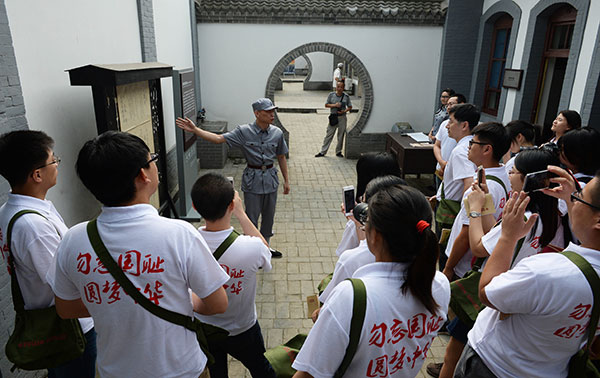35 mln Chinese died during 14-year Japanese invasion
 0 Comment(s)
0 Comment(s) Print
Print E-mail China Daily, July 15, 2015
E-mail China Daily, July 15, 2015
 |
|
A youth delegation visits a museum about the War of Resistance against Japanese Aggression (1937-45) on Thursday in Xi'an, Shaanxi province. [By Liu Xiao /Xinhua] |
During the 14-year Japanese invasion of China, the Chinese suffered more than 35 million military and nonmilitary casualties, accounting for a third of the total casualties of all the countries in World War II.
Military casualties during the invasion totaled 3.8 million, according to updated figures released on Tuesday.
At the 1937 exchange rate, property losses incurred by the Chinese amounted to more than $100 billion, with indirect economic losses of $500 billion.
The updated figures for Chinese casualties and property losses during the war and new research on China's contribution to victory in World War II were released at a briefing by the State Council Information Office.
They also show that Chinese forces killed, wounded or captured more than 1.5 million Japanese troops in the war.
The figures form the second part of a survey organized by the Party History Research Center of the Communist Party of China Central Committee. The survey was launched in October 2004, and about 600,000 people have taken part.
Li Zhongjie, former deputy director of the research center, said: "The work started decades late and we should have done it earlier. We have the responsibility to tell our offspring the clear facts about the war.
"We want to tell people that the Japanese invaders committed so much slaughter, and the Nanjing Massacre is just one example," Li said. "The survey method involved was mainly to consult and collect all kinds of archives, newspapers and research results from those years."
Each province was responsible for investigating casualties and property losses in their administrative areas. This work expanded from city and county level to townships and villages, Li said.
"For example, Shandong province has more than 6 million registered elders who are more than 70 years old, and our workers visited some 5 million. Some were too old to speak, or had serious illnesses, but we still collected 290,000 items of testimony."
Wang Jianlang, director of the Institute of Modern History at the Chinese Academy of Social Sciences, said, "The survey shows that China was not only defending its homeland, but also the security of other countries.
"China's lasting war of resistance won valuable time for other anti-fascist countries to prepare, including the Soviet Union, the United States and Britain."
Wang said that after the Pacific War broke out, China remained the main Far East battlefield in World War II.
"Because of China's war efforts, Japan was unable to dispatch more troops to the Pacific, which was a significant support to the Allied forces," he added.
According to Li, all the survey findings will be compiled into a series on Chinese population casualties and property losses during the war and divided into two series comprising about 300 books. "Besides going to Taiwan to consult files, we also collected archives from the United States, Russia and Japan."
The first survey results, published in September, comprised 46 volumes in five categories. The second survey published recently includes 12 provincial volumes.
"After several decades, we have collected the casualties and property losses from the war, not to call for Chinese to hate Japan, but to tell people that the lessons of history should be commemorated," Li said.






Go to Forum >>0 Comment(s)